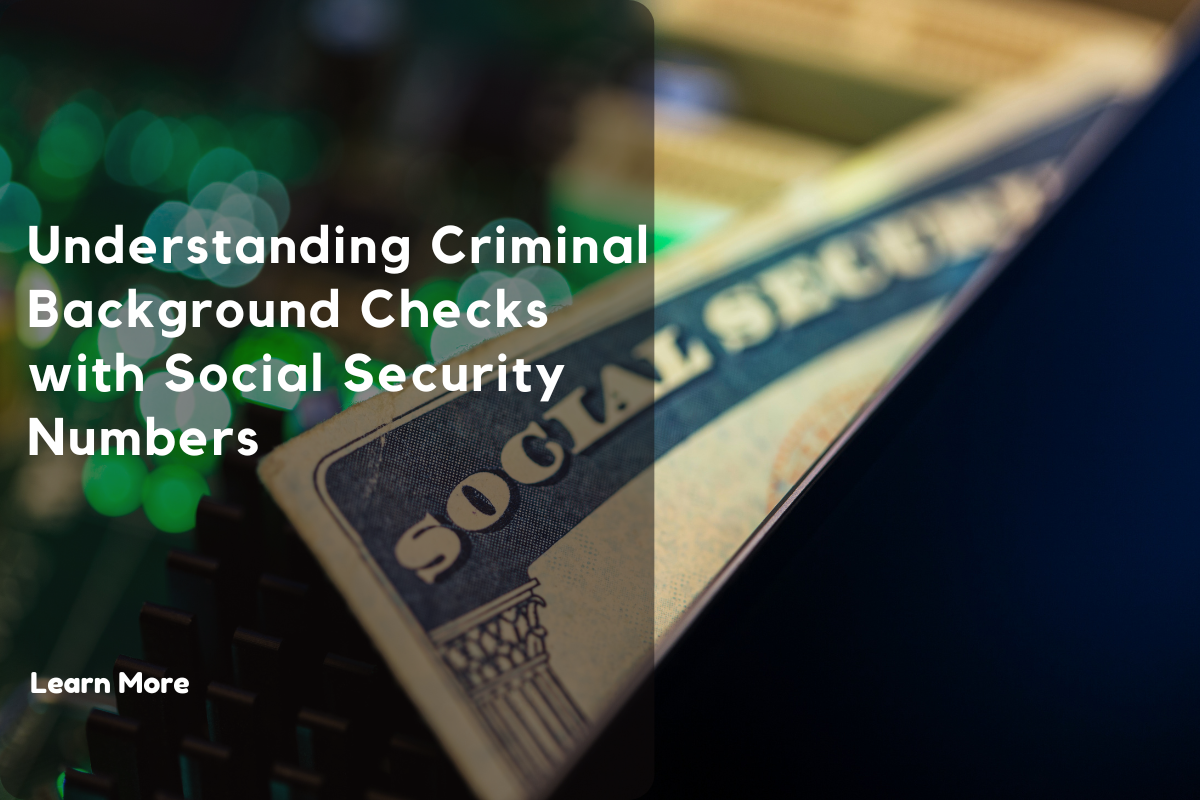
What is a Criminal Background Check?
A criminal background check is a procedure used to investigate an individual’s criminal history, which includes arrests, convictions, and other relevant legal information. This process is a critical component of making informed decisions in various contexts such as employment, housing, or obtaining a license. Criminal background checks ensure that individuals with a history of criminal activity are screened appropriately before they are hired, granted housing, or permitted to engage in specific activities.
In today’s society, background checks have become an essential step for employers and landlords who want to verify the safety and reliability of individuals before forming professional or personal relationships. Background checks help prevent potential risks by ensuring that individuals with violent histories, financial crimes, or other relevant offenses are identified early in the hiring or renting process.
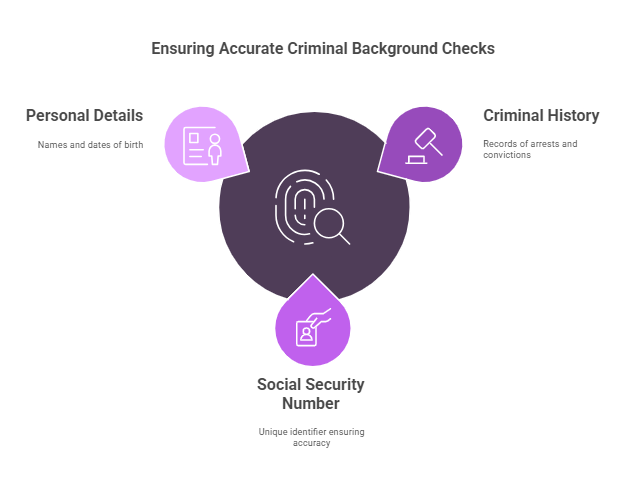
The Role of the Social Security Number (SSN) in Criminal Background Checks
The Social Security Number (SSN) is a unique identifier assigned to U.S. citizens, permanent residents, and certain temporary residents. Originally established for the purpose of tracking individuals for Social Security purposes, the SSN has evolved into one of the most important identifiers in various systems, including criminal background checks.
When conducting a criminal background check, an SSN acts as a unique identifier that ensures the individual being investigated is accurately identified. While names, dates of birth, and other personal details may sometimes be shared by multiple people, the SSN is exclusive to each individual, making it the most effective tool for ensuring accurate criminal record searches. Using an SSN during a background check minimizes the chances of mistakes, such as linking a person to someone else with similar identifying information.
The importance of using an SSN in criminal background checks lies in the precision and reliability it brings to the process. Instead of relying solely on potentially common personal data, background checks that incorporate an SSN ensure that the report is linked to the correct individual, significantly reducing errors and improving the overall accuracy of the information.
The Advantages of Using an SSN in Criminal Background Checks
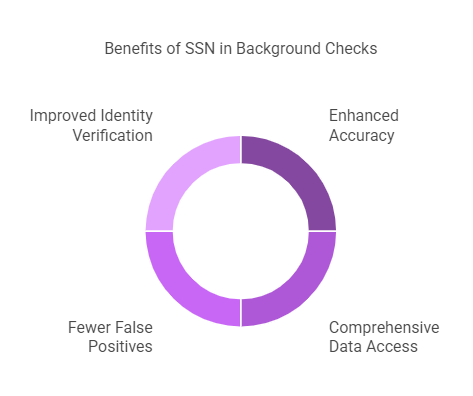
There are several compelling reasons why using an SSN in criminal background checks is advantageous for both individuals and organizations. These include:
- Enhanced Accuracy: By linking the background check to the unique SSN, the process ensures that no errors are made in identifying the person being investigated. Given that names are common and individuals may have similar birthdates, an SSN provides the most precise way to connect an individual with their criminal record. This is especially important in situations like employment screenings, where accuracy is crucial to avoid mistakenly rejecting qualified candidates.
- Access to Comprehensive Data: When conducting a criminal background check using an SSN, agencies can search multiple databases, including local, state, and federal records. The SSN helps pinpoint criminal history across various jurisdictions, which means a more thorough investigation is conducted. It allows organizations to access arrest records, convictions, sex offender registry status, warrants, and other court-related documents that may be critical to making informed decisions.
- Fewer False Positives: Without using an SSN, a background check might link an individual to criminal records that belong to someone else with a similar name. This is especially problematic in cases where the person being screened has a common name or shares birthdates with another individual. SSN-based checks drastically reduce the likelihood of these false positives, ensuring that background checks are tied to the correct person.
- Improved Identity Verification: In many industries, verifying an individual’s identity is essential to ensure safety, legal compliance, and trustworthiness. When conducting background checks using an SSN, organizations can also verify that the individual is who they claim to be. This is particularly important in situations involving financial transactions, hiring decisions, or sensitive environments where misrepresentation could lead to significant risks.
The Process of Conducting a Criminal Background Check Using an SSN
The process of obtaining a criminal background check using an SSN is relatively straightforward but requires specific steps to ensure the information obtained is both accurate and reliable. Below is an overview of how this process typically works:
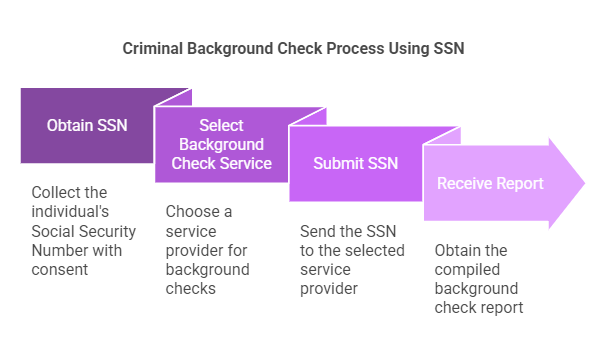
- Obtaining the SSN: The first step in conducting a criminal background check using an SSN is to acquire the individual’s Social Security Number. This is typically collected during job applications, rental applications, or any situation where a background check is needed. Employers, landlords, and other organizations must obtain written consent from the individual before initiating the background check process.
- Selecting a Background Check Service: Once the SSN is obtained, the next step is to choose a background check service provider. There are various options available, including private background check companies, government agencies, or third-party services that specialize in criminal record searches. Many background check providers allow individuals and organizations to run SSN-based background checks online, making the process convenient and efficient.
- Submission of the SSN: After selecting a service provider, the SSN is submitted to the chosen service. The provider will use the SSN to search through criminal databases to find any relevant records associated with that particular number. Depending on the service, results may be delivered quickly or take several days to process, especially when searching through multiple jurisdictions or verifying records across states.
- Receiving the Report: After the SSN is processed, the background check results are compiled into a report that is delivered to the requesting organization or individual. This report typically includes any criminal history associated with the SSN, including arrest records, convictions, court proceedings, and active warrants. The results will be presented in a clear, easy-to-read format to ensure that decision-makers can review the information thoroughly.
Who Can Request a Criminal Background Check Using an SSN?
Criminal background checks using an SSN can typically be requested by authorized individuals and organizations. These include:
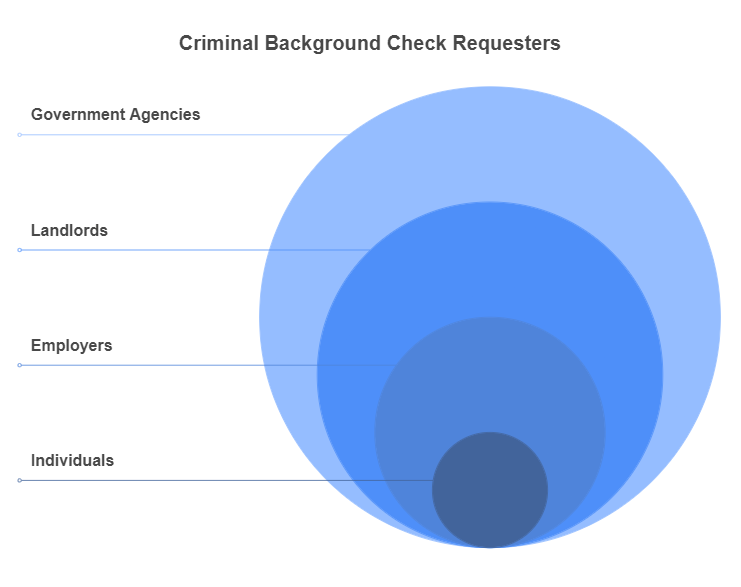
- Employers: Employers often require background checks to assess the suitability of potential employees. The SSN is particularly useful for verifying a candidate’s criminal history and ensuring that there are no previous offenses that could affect their ability to perform the job safely and responsibly.
- Landlords and Property Managers: When renting out property, landlords need to ensure that potential tenants have a clean criminal record, especially regarding violent crimes, theft, or any offenses that could endanger other tenants or property.
- Government Agencies and Licensing Authorities: Various licensing authorities use background checks to determine whether an individual is fit to hold a professional license. This includes healthcare professionals, financial advisors, and others who may have access to sensitive information or require a high level of trust.
- Individuals: Individuals may also request their own criminal background checks to verify the accuracy of the information or to prepare for any upcoming legal or employment processes.
Types of Information Accessed Through an SSN-Based Criminal Background Check
The following is a summary of the types of information typically accessed when conducting a criminal background check using an SSN:
| Type of Information | Details |
|---|---|
| Arrest Records | Information about any arrests made, including arrest dates and charges. |
| Conviction Records | Details of criminal convictions, including the severity of the crime and any sentencing. |
| Sex Offender Registry Status | Information about whether the individual is registered as a sex offender. |
| Active Warrants | Information about any active warrants issued for the individual. |
| Court Records | Records from criminal court cases involving the individual. |
| Probation/Parole Status | Information regarding probation or parole status for individuals. |
| Federal, State, and County Records | Criminal history data from local, state, and federal law enforcement agencies. |
The Detailed Process and Practical Applications of Criminal Background Checks Using SSNs
The Step-by-Step Process of Conducting a Criminal Background Check Using an SSN
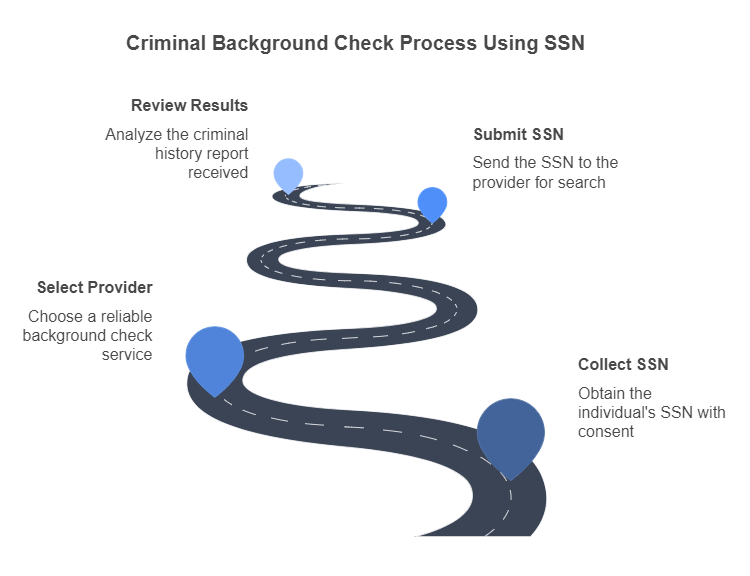
Conducting a criminal background check using a Social Security Number (SSN) involves a series of steps that must be carried out with precision to ensure that the results are accurate and trustworthy. This section will delve deeper into each step of the process, providing a clear understanding of how criminal background checks are conducted and what to expect.
- Collecting the SSN
The first step in the process is to collect the individual’s Social Security Number. This is often obtained during the application process, whether for employment, housing, or other purposes. The SSN must be provided with the consent of the individual being investigated, as using someone’s SSN without permission could violate privacy rights. In many cases, the SSN is part of the application form, which allows the employer, landlord, or other requestor to initiate the background check once they have the applicant’s consent.
- Selecting the Background Check Provider
Once the SSN has been obtained, the next step is to choose the right background check provider. There are numerous agencies and services available to conduct SSN-based criminal background checks, ranging from government-run databases to private companies that specialize in criminal history searches. These providers have access to a wide array of resources, such as federal, state, and local criminal record databases, to conduct a thorough background check.
When choosing a background check provider, it’s important to ensure that they comply with relevant legal and privacy regulations. Many services allow individuals and organizations to perform background checks online, which speeds up the process. However, it’s essential to ensure that the service provider is reliable, follows strict security protocols, and abides by legal standards to protect sensitive data.
- Submitting the SSN for Search
After selecting the appropriate service provider, the SSN is submitted to initiate the criminal background check process. The provider uses the SSN to search across multiple databases, including those at the local, state, and federal levels, in search of criminal records associated with that specific number. The SSN ensures that the search is accurate and only pulls information related to the correct individual.
For employers, landlords, and other organizations, the results of this search can help identify any criminal offenses that may pose a risk. It’s worth noting that the provider will also verify that the SSN belongs to the person whose criminal history is being reviewed. This step helps avoid situations where individuals with similar names or birthdates could be mistakenly connected to criminal records.
- Reviewing the Results
Once the background check has been completed, the results are delivered to the requesting party. The report typically includes a variety of information based on the individual’s criminal history, such as:
- Arrest records
- Conviction details
- Court rulings
- Information from sex offender registries
- Any active warrants
The results will also indicate whether the individual has ever been incarcerated, is currently serving a sentence, or has been placed on parole or probation. For employers, landlords, and licensing authorities, these details are crucial in assessing the applicant’s risk level and suitability for a given position, role, or residency.
Practical Applications of SSN-Based Criminal Background Checks
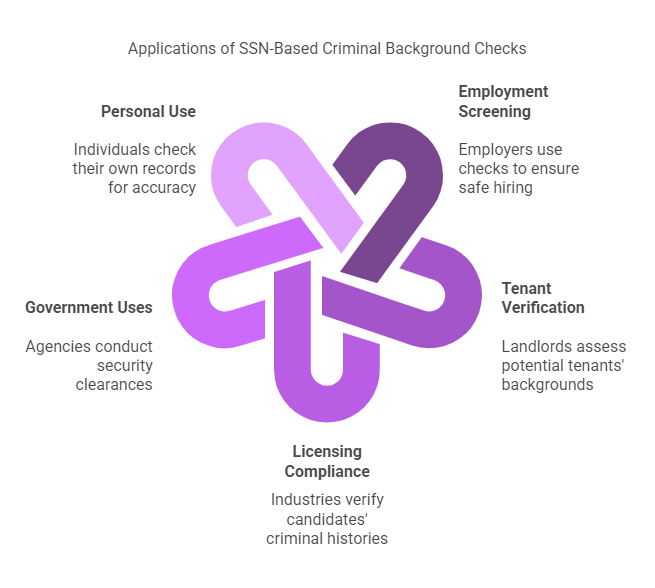
Criminal background checks using SSNs are used in a variety of contexts, ranging from employment screening to tenant verification. These applications are vital for organizations that need to ensure the safety, trustworthiness, and reliability of individuals in positions of responsibility.
1. Employment Screening
Employers commonly use criminal background checks as part of their hiring process. By conducting a thorough background check using an SSN, employers can ensure that they are hiring qualified candidates who do not pose any safety risks to their staff, customers, or organization. Background checks may include an examination of any criminal activity such as:
- Violent crimes (e.g., assault, battery)
- Theft and fraud
- Drug-related offenses
- Sexual offenses
The use of an SSN in this context allows employers to be certain that they are investigating the correct individual and retrieving the most accurate criminal records associated with the candidate. An SSN-based check helps identify criminal offenses that may not show up when relying solely on a name search or birthdate.
2. Tenant Verification
Landlords and property managers also rely on criminal background checks to assess potential tenants. Renting to individuals with a criminal history of violence, theft, or drug offenses can pose significant risks, so conducting a background check using an SSN allows landlords to make well-informed decisions. The SSN enables them to access criminal records that help ensure the safety of other tenants and the property.
Background checks for tenants are often part of the standard application process, and in many states, it’s legally required for landlords to perform them before approving a tenant. By using an SSN, landlords can be confident in identifying individuals with criminal backgrounds and make decisions based on the severity of the offenses.
3. Licensing and Regulatory Compliance
Certain industries and professions require individuals to undergo criminal background checks as part of the licensing process. This is common in fields such as healthcare, education, finance, and security. Regulatory authorities require that background checks be conducted to assess whether individuals seeking a license have a history of criminal activity that could potentially endanger others or violate ethical guidelines.
For example, healthcare providers may be required to undergo a background check to ensure they have no history of medical fraud, abuse, or drug-related crimes. Similarly, financial advisors must undergo background checks to verify that they are not involved in financial crimes or fraud. Using SSNs to conduct these background checks ensures that the results are accurate and comprehensive, covering federal, state, and county criminal records.
4. Government and Law Enforcement Uses
Law enforcement agencies and government organizations also use criminal background checks as part of security clearance evaluations, investigations, or applications for sensitive roles. SSN-based checks allow these agencies to track individuals more accurately and ensure that sensitive positions are filled by trustworthy candidates who have no history of criminal involvement. These checks are especially important for positions that involve access to national security, public safety, or sensitive financial information.
5. Self-Checks and Personal Use
Individuals may also use SSN-based criminal background checks to investigate their own records. This is particularly useful for those who want to verify that their criminal history is accurately reflected in databases. It’s also beneficial for individuals who are applying for jobs, housing, or loans, as these checks allow them to address any discrepancies or errors in their criminal records before they become an issue during a background screening process.
In many cases, individuals can order a background check on themselves using their SSN from various online platforms. This gives them the ability to review their records, dispute any errors, or take necessary actions to resolve any issues before they become a barrier to personal or professional goals.
Handling SSN Data and Privacy Concerns
While SSNs are essential for conducting accurate criminal background checks, they also present significant privacy and security concerns. SSNs are highly sensitive personal data, and mishandling this information can lead to identity theft, fraud, or legal issues. Organizations that handle SSNs as part of background check processes must implement strict data protection measures to ensure that the SSNs are securely stored, transmitted, and disposed of when no longer needed.
For example, background check providers must comply with regulations such as the Fair Credit Reporting Act (FCRA), which mandates that personal information, including SSNs, is used only for permissible purposes and safeguarded throughout the process. Additionally, individuals and organizations should always verify that the service provider they choose adheres to these regulations to ensure compliance and protect sensitive data.
The Importance of Accuracy and Privacy in SSN-Based Background Checks
Accuracy and privacy are paramount when conducting criminal background checks using an SSN. Errors in criminal record data or mishandling of SSNs can lead to incorrect conclusions, which can negatively impact an individual’s employment prospects, housing applications, or legal standing. The potential consequences of such errors make it essential to use a reliable background check service that can provide accurate, up-to-date results while safeguarding personal information.
Rapid Hire Solutions and SSN-Based Background Checks
At Rapid Hire Solutions, we specialize in providing accurate, fast, and secure criminal background checks using SSNs. Our services help employers, landlords, and other organizations ensure that they are making informed decisions based on reliable criminal history information. We offer a comprehensive range of background check services, including SSN-based checks, that adhere to legal standards and provide results that are both accurate and easy to interpret.
Our platform allows for quick submission and processing of background checks, ensuring that you receive the information you need without unnecessary delays. Whether you are hiring new employees, vetting tenants, or verifying licensing eligibility, Rapid Hire Solutions can help you navigate the complexities of background screening with confidence.
We also understand the importance of protecting personal data, which is why we implement the highest security measures to ensure that all SSN data is handled with care and in compliance with privacy laws. When you choose Rapid Hire Solutions, you are partnering with a reliable service that prioritizes accuracy, privacy, and legal compliance in every step of the background check process.
Legal Aspects of Criminal Background Checks Using SSNs
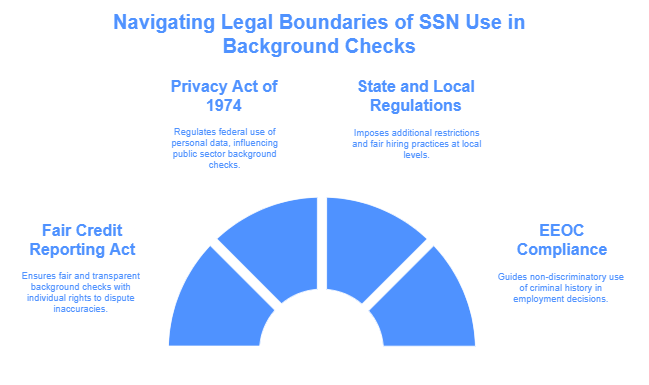
The use of Social Security Numbers (SSNs) in criminal background checks is governed by several laws and regulations to ensure privacy, accuracy, and fairness. It’s essential for both individuals and organizations to understand the legal framework that surrounds these background checks, as improper use or non-compliance can lead to significant legal repercussions.
- Fair Credit Reporting Act (FCRA)
The Fair Credit Reporting Act (FCRA) is one of the most important laws that regulate the use of personal information in background checks. Enacted in 1970, the FCRA ensures that background checks are conducted fairly and transparently, providing individuals with the right to dispute inaccurate information. The FCRA also governs how criminal background information, including SSNs, can be accessed, used, and reported.
Under the FCRA, employers and other entities must obtain written consent from the individual before performing a criminal background check. Additionally, if an individual is denied a job or service based on the results of a background check, the organization must notify the individual and provide a copy of the report to allow them to dispute any inaccuracies.
- The Privacy Act of 1974
The Privacy Act of 1974 is another important law that governs the use of personal information, including SSNs, by federal agencies. This act limits the circumstances under which federal agencies can collect, store, and disseminate personal data, including criminal history records. While the Privacy Act primarily applies to government entities, it influences how criminal background checks are conducted by public institutions and helps ensure that SSNs are only used for authorized purposes.
- State and Local Regulations
In addition to federal regulations, state and local laws may impose additional requirements or restrictions on how criminal background checks using SSNs are conducted. For instance, some states have “ban the box” laws, which prohibit employers from asking about an applicant’s criminal history during the initial stages of the hiring process. Other states may have more stringent rules on what criminal history information can be accessed, when it can be reported, and how long it can be retained.
For example, in some states, criminal background checks may be limited to specific timeframes, such as only considering offenses that occurred within the past seven years. These regulations are designed to protect individuals from being unfairly penalized for old criminal records and to promote fair hiring practices.
- Compliance with the Equal Employment Opportunity Commission (EEOC)
The Equal Employment Opportunity Commission (EEOC) provides guidance on how criminal background checks should be conducted in a way that does not discriminate against individuals based on race, color, national origin, sex, disability, or religion. The EEOC’s guidelines emphasize that employers must consider the nature of the offense, the time that has passed since the offense, and the nature of the job when making decisions based on criminal history.
For example, employers should not automatically reject candidates with a criminal record unless the offense is directly related to the job. Using SSNs helps ensure that criminal background checks are accurate and based on the correct individual, reducing the risk of discrimination.
Frequently Asked Questions (FAQs)
Here are some common questions related to criminal background checks using SSNs and their corresponding answers:
Why is my Social Security Number needed for a criminal background check?
Your Social Security Number is a unique identifier that helps ensure the background check is conducted for the correct individual. Using an SSN in a background check allows agencies to access accurate criminal records and avoid errors that might occur if only your name or birthdate were used. Since SSNs are unique to each individual, they provide the most reliable way to confirm your identity during the background check process.
How secure is my SSN during the background check process?
The security of your SSN during the background check process depends on the service provider you choose. Reputable providers will follow strict security protocols to ensure that your SSN is securely stored and transmitted. It is essential to use services that comply with privacy regulations, such as the Fair Credit Reporting Act (FCRA), to ensure that your personal information is protected. Be sure to verify that the background check service you use is certified and follows industry standards for data security.
Can I perform a criminal background check on myself using my SSN?
Yes, you can perform a criminal background check on yourself using your SSN. In fact, it is a good idea to regularly check your own criminal record to ensure that there are no errors or discrepancies that could affect your job applications or other important processes. Many online platforms allow individuals to request their own criminal background reports using their SSN. If you find any inaccuracies, you have the right to dispute them with the appropriate authorities.
What should I do if there is an error in my criminal background check linked to my SSN?
If you find an error in your criminal background check, you should immediately contact the service provider and the agency that reported the information (e.g., the police department, court, or state repository). Under the Fair Credit Reporting Act (FCRA), you have the right to dispute any inaccurate information. The agency is required to investigate the dispute and correct any errors within a reasonable time frame. It’s important to act quickly to ensure that the error is corrected before it affects your job prospects or legal matters.
How long does it take to get results from a criminal background check using an SSN?
The time it takes to get results from a criminal background check using an SSN can vary depending on the service provider and the complexity of the search. For straightforward cases, results may be available within a few hours or days. However, if the background check involves multiple jurisdictions or requires verification from various sources, it may take longer to complete. Most providers will provide an estimated timeline for when you can expect to receive the results, and many offer expedited services for an additional fee.
Conclusion: The Importance of Accurate and Secure SSN-Based Criminal Background Checks
Criminal background checks using SSNs are an essential part of ensuring safety and trustworthiness in various contexts, such as employment, housing, and licensing. By linking the background check to a unique identifier like the SSN, the process becomes more accurate, reducing the risk of errors and false positives. This ensures that employers, landlords, and other decision-makers can make informed choices based on reliable information.
However, it’s important to be mindful of the legal considerations surrounding SSN-based background checks. Understanding the laws, including the Fair Credit Reporting Act (FCRA), the Privacy Act, and state-specific regulations, is crucial to ensuring compliance and protecting the privacy of individuals. By following these regulations, organizations can help maintain fairness and transparency throughout the background check process.
For those seeking a reliable and secure way to conduct criminal background checks using SSNs, services like Rapid Hire Solutions can provide accurate, efficient, and compliant background checks. By partnering with trusted professionals, you can ensure that your background screening process meets legal requirements and provides the information needed to make the best decisions.
